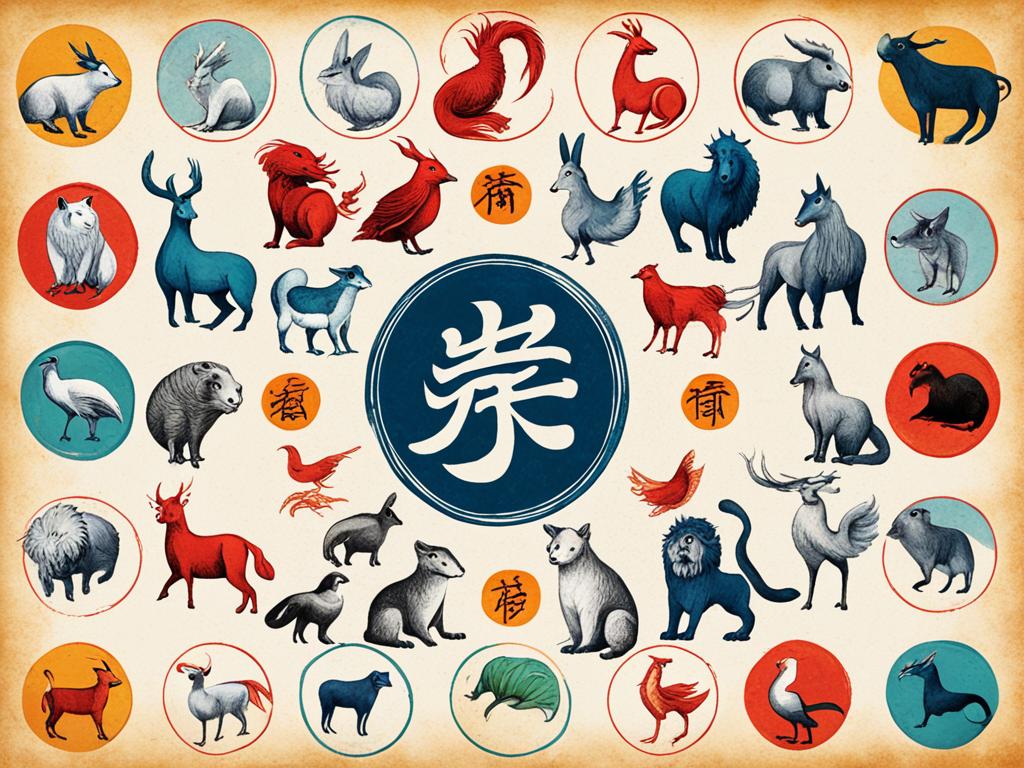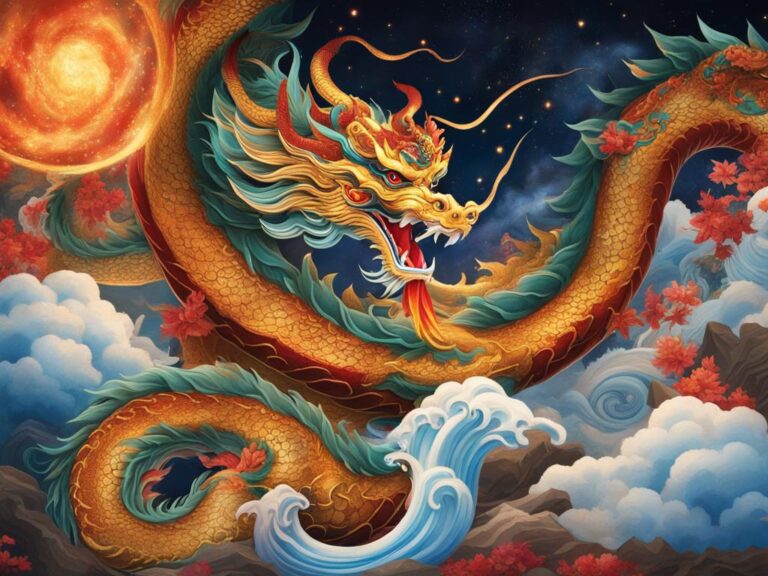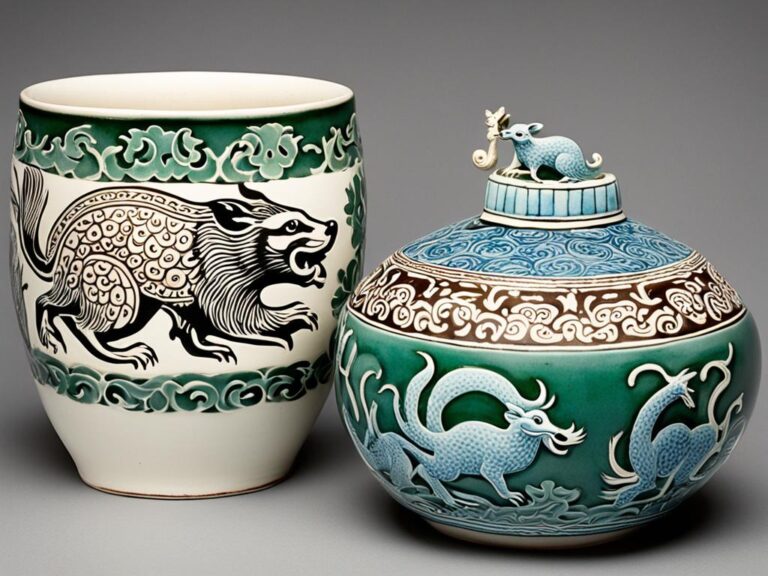Chinese Personal Names – The Zodiac’s Impact – In ancient Chinese culture, names held immense significance and were considered sacred and even mystical. The naming process was included in the rules of etiquette during the Zhou Dynasty, highlighting the importance of names in Chinese society. Chinese names have the power to influence how individuals are treated, with certain names perceived as auspicious or ominous. Additionally, there are Chinese name generators available for foreigners looking to adopt a Chinese name, allowing them to express their seriousness, respect for Chinese culture, and personal values.

Key Takeaways:
- The naming process was considered sacred and mystical in ancient Chinese culture.
- Chinese names have the power to influence how individuals are treated.
- Foreigners can adopt Chinese names to show their respect for Chinese culture.
Importance of Chinese Names
In Chinese culture, names hold immense significance and are deeply influenced by the teachings of Confucius. The Chinese people believe that a person’s name can directly impact their destiny and the treatment they receive in society. Names that are favored by emperors, scholars, or top generals often lead to preferential treatment, creating opportunities for success and advancement. On the other hand, names that are considered ominous can result in unfavorable treatment and difficulties in life.
The cultural belief in the importance of names goes beyond mere labels. Chinese names are seen as a representation of one’s character, fate, and even the success or failure they may encounter in life. It is believed that a well-chosen name can bring good fortune, while a poorly chosen one may bring misfortune. This belief has been ingrained in Chinese naming traditions for centuries, shaping the way names are chosen and valued within the culture.
The significance of Chinese names extends beyond the individual. They are also seen as a reflection of the family and its values. Chinese naming traditions often involve generational names, where certain characters are passed down through family lines to maintain continuity and honor ancestors. Names are carefully selected to carry the weight of familial expectations and pride.
In addition to family connections, Chinese names are deeply intertwined with cultural and historical values. The teachings of Confucius emphasize the importance of respect, honor, and filial piety, all of which are embodied in the choice of a Chinese name. These values are passed down through generations, creating a strong sense of continuity and cultural identity.
Role of Names in Chinese Culture
In Chinese culture, names hold the power to shape a person’s destiny and influence their interactions with others. They are seen as an essential aspect of identity, representing not only the individual but also their family and cultural heritage. Names play a crucial role in social interactions, creating initial impressions and influencing perceptions. A well-chosen name that reflects positive qualities and aligns with cultural values can provide individuals with advantages and opportunities in various aspects of life.
Chinese Personal Names – Naming Traditions in China
Chinese naming traditions are rooted in various cultural and historical influences. The choice of characters, their meanings, and the compositions of names are carefully considered to align with cultural symbolism, numerology, and astrology. Chinese names often employ characters that carry positive meanings, such as success, prosperity, longevity, or wisdom. They may also incorporate elements of the Chinese zodiac or the five elements (fire, wood, water, metal, and earth) to foster balance and harmony.
Naming traditions in China can vary among regions, dialects, and ethnic groups, resulting in a rich tapestry of naming practices throughout the country. Despite these variations, the underlying belief in the significance of names remains constant across Chinese culture, emphasizing the vital role that names play in shaping personal and social identities.

Chinese Zodiac and Naming
Chinese naming traditions often incorporate the influence of the Chinese Zodiac. The Chinese believe that by examining the likes and dislikes associated with an individual’s zodiac sign, they can select auspicious Chinese characters that enhance their destiny. This practice allows individuals to align their names with their zodiac signs, bringing positive energy and good luck into their lives.
The Chinese Zodiac consists of twelve animal signs, each representing a different year in a twelve-year cycle. These animal signs are the Rat, Ox, Tiger, Rabbit, Dragon, Snake, Horse, Sheep, Monkey, Rooster, Dog, and Pig. Each zodiac sign has specific characteristics and attributes associated with it.
Chinese Zodiac signs play a crucial role in determining the compatibility between individuals. The signs are also believed to have an impact on personal characteristics, emotions, and relationships. By incorporating the Chinese Zodiac into naming traditions, individuals aim to align their names with their zodiac signs and harness the positive traits associated with them.
For instance, let’s consider an individual born in the Year of the Rabbit. According to Chinese astrology, Rabbits are known for their kindness, sensitivity, and social nature. Therefore, when choosing a name, parents might opt for characters that symbolize these qualities, such as “Yuan,” which means “kindness,” or “Jing,” which means “gentle.”
The practice of aligning names with the Chinese Zodiac is rooted in the belief that doing so can positively influence an individual’s destiny and bring them good fortune. It is considered a way to harmonize one’s life with the cosmic forces represented by the zodiac signs.
Chinese Personal Names – Chinese Zodiac Compatibility with Names
Chinese Zodiac signs are not only influential in naming, but they also play a role in determining compatibility between individuals. According to Chinese astrology, certain zodiac signs are more compatible with each other, while others may clash or experience challenges when paired together.
By considering the compatibility between an individual’s zodiac sign and the zodiac signs associated with potential partners, parents may choose names for their children that enhance compatibility and promote harmonious relationships. This belief in compatibility reinforces the idea that names can influence an individual’s personal life and destiny, extending beyond a mere label.
To illustrate, let’s take a look at the compatibility between the Rat and the Dragon, based on Chinese astrology. The Rat is believed to be compatible with the Dragon, as they both possess complementary traits. Therefore, if parents want to enhance the compatibility between their child and individuals born in the Year of the Dragon, they may select characters associated with the Rat or Dragon zodiac sign for their child’s name.

The Chinese Zodiac’s influence on naming is a significant aspect of Chinese culture and traditions. It reflects the deep-rooted belief in the interconnectedness of an individual’s name, destiny, and the cosmic forces represented by the zodiac signs. By selecting names that align with their zodiac signs, individuals strive to bring positive energy and good fortune into their lives.
Factors Influencing Chinese Names
When choosing a Chinese name, several factors come into play. The composition of Chinese names is influenced by various elements that aim to bring balance and improve an individual’s luck. The incorporation of these elements is guided by Chinese name astrology and numerology.
One crucial consideration when selecting Chinese characters for a name is the elements of fire, wood, water, metal, and earth. Each element is associated with specific qualities and energies that can have an impact on a person’s life. By incorporating characters representing these elements into a name, individuals strive to create balance and attract positive energy.
Another factor to contemplate is the length of the name. Chinese names are typically made up of two or three characters, and the number of strokes in each character can also play a role in determining luck. Some believe that names with an unbalanced number of strokes may bring imbalance or disharmony, while names with an optimal stroke count can enhance fortune.
Generational names are another aspect to consider. In Chinese culture, it is common for families to share a generational name that is passed down from one generation to the next. The generational name connects individuals within a family lineage and reflects their shared heritage and values.
Zodiac signs also play a role in influencing Chinese names. Each of the twelve zodiac signs is associated with specific characteristics and preferences. Selecting characters that align with an individual’s zodiac sign can help enhance their destiny by complementing their personality traits and attracting positive energy.
Astrology and numerology are essential factors in the Chinese naming process. Fortune tellers interpret astrological and feng shui principles to create harmonious names that align with an individual’s birth date and destiny. By considering all these factors, individuals strive to create names that bring them balance, luck, and a positive path in life.
Superstitions and Name Changes
While there is no scientific evidence to support the idea that changing one’s name can bring actual fortune, it can have a powerful psychological impact. Name changes can provide individuals with a sense of control and a belief that they can alter the course of events. This placebo effect can lead to increased confidence, which may positively contribute to the trajectory of one’s life. Changing names during times of uncertainty, such as economic downturns or high unemployment rates, is a common practice in East Asian countries.
According to superstitions, changing one’s name can bring good luck and ward off any negative energies that are associated with the previous name. This belief is deeply rooted in Chinese culture, where many people believe that the name they are given at birth can influence their destiny and fortune. By changing their name, individuals hope to attract positive energy and improve their overall luck.
In Chinese culture, name changes are not taken lightly. They are often seen as significant life events and are accompanied by rituals and ceremonies. It is believed that changing one’s name can bring about a fresh start and open doors to new opportunities. While the actual impact of the name change may be subjective, the psychological impact can be profound.
When individuals change their name, they often feel a renewed sense of control over their lives. It gives them a chance to redefine themselves and align their new name with their desired goals and aspirations. This sense of empowerment can boost self-confidence and motivation, leading to positive changes in various aspects of life, such as personal relationships, career, and overall well-being.
The psychological impact of name changes can also be attributed to the placebo effect. When an individual believes that changing their name will bring about positive changes, their thoughts and actions may align with this belief, leading to a self-fulfilling prophecy. By having a positive mindset and increased confidence, individuals may be more inclined to seize opportunities and overcome challenges, ultimately shaping their own fortune.
Changing Names for Good Luck
Changing names for good luck is a common practice not only in Chinese culture but also in many other cultures around the world. Whether it’s adding or removing certain letters, changing the order of names, or adopting a completely new name, it is believed that these changes can alter one’s fate and bring about favorable outcomes.
Individuals who believe in the power of name changes often consult fortune tellers or seek advice from experts in numerology and astrology. These experts analyze various factors, such as the individual’s birth date, zodiac sign, and the strokes of Chinese characters, to determine the most auspicious name that will align with the individual’s destiny.
In some cases, individuals may choose to change their name multiple times throughout their lives, especially during significant life transitions or when faced with challenging circumstances. The belief is that by changing their name, they can create a fresh start and attract positive energy, increasing their chances of success and happiness.
Name Changes in Chinese Culture
In Chinese culture, name changes are deeply influenced by superstitions and the desire for good fortune. It is believed that the name a person carries can directly impact their destiny and overall well-being. As a result, many individuals may choose to change their names to improve their luck and achieve their desired goals.
The Chinese have a long-standing tradition of considering names as sacred and meaningful. The choice of characters in a name is meticulously planned to align with the individual’s zodiac sign, birth date, and other factors considered to have an impact on their destiny. By selecting auspicious characters and avoiding those associated with bad luck, individuals hope to enhance their good fortune and ensure a positive path in life.
Name changes are often accompanied by rituals and ceremonies, symbolizing the transition to a new identity and a fresh start. These rituals may involve offerings, prayers, and the participation of family members and close friends. The entire process is viewed as an important life event and is treated with respect and reverence.
Chinese Personal Names – Name’s Influence on Fortune
The belief in the influence of names on an individual’s fortune is deeply ingrained in Chinese culture. It is believed that the name a person carries can shape their destiny and impact their overall success and happiness. Certain names are associated with positive qualities and are believed to attract good fortune, while others may be seen as inauspicious and can bring about negative energies.
Chinese names are carefully chosen to align with a person’s zodiac sign, elemental balance, and other factors considered to have an impact on fate. It is believed that by selecting an auspicious name, individuals can enhance their luck and increase their chances of achieving their desired goals. This belief in the power of names extends beyond just personal names and can also be seen in business and company names, as well as in the naming of important events and ceremonies.
While the influence of names on fortune may be subjective and based on cultural beliefs and superstitions, it remains an important aspect of Chinese culture and continues to shape naming traditions and practices.
Conclusion
Chinese naming traditions hold deep cultural and historical significance. The influence of the Chinese Zodiac on personal names is a fundamental aspect of these traditions. While changing one’s name does not guarantee good fortune, it can provide individuals with a renewed sense of control and confidence in their lives.
Chinese communities continue to embrace name changes, whether due to superstition or the psychological impact they bring. The belief in the power of names to shape destiny remains strong. By aligning their names with their zodiac signs, individuals hope to attract positive energy and enhance their luck.
The cultural significance of Chinese names cannot be understated. Names are seen as a representation of one’s character, fate, and even the success or failure of their life. Chinese naming traditions are influenced by various factors, including astrology, numerology, and the elements. Striving to create harmonious names that complement an individual’s birth date and align with their destiny is a key consideration in Chinese naming practices.
As we delve into the fascinating world of Chinese names, it becomes clear that names hold immense power and meaning within Chinese culture. While the influence of the Chinese Zodiac on names varies, the belief in its impact persists. By understanding the role of names in Chinese society and embracing naming traditions, individuals can navigate their lives with a deep appreciation for the cultural heritage tied to their names.
FAQ
How does the Chinese Zodiac impact personal names?
The Chinese Zodiac influences personal names by selecting auspicious characters that align with an individual’s zodiac sign, bringing positive energy and good luck.
What is the significance of Chinese names?
Chinese names are considered sacred and have the power to influence treatment and destiny. They reflect one’s character, fate, and can even determine their success or failure in life.
How does Chinese astrology and feng shui influence name selection?
Chinese astrology and feng shui help in selecting characters that bring balance and improve luck. The goal is to create a harmonious name that aligns with an individual’s birth date and destiny.
Is there scientific evidence to support the belief that changing one’s name can bring good fortune?
No, there is no scientific evidence. However, changing one’s name can have a psychological impact, boosting confidence and providing individuals with a sense of control.
What factors should be considered when choosing a Chinese name?
Factors include the elements of fire, wood, water, metal, and earth, the length of the name, generational names, zodiac signs, and the strokes of Chinese characters.
Why do some people change their names during uncertain times?
Changing names during uncertain times is a common practice in East Asian countries. It provides individuals with a renewed sense of control and confidence, which can positively impact their life trajectory.





